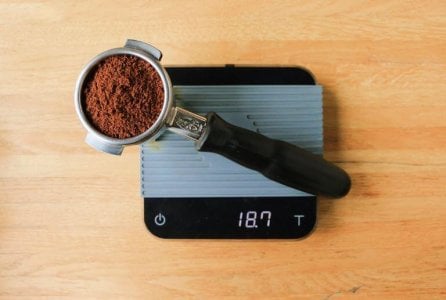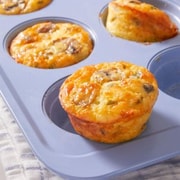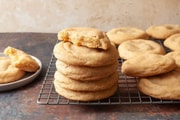Don't let your Christmas feast go to waste with these 5 easy tips
- Replies 0
When it comes to the festive season, something we always look forward to is the delectable spread of delicious meals, desserts, and treats.
But with great feasts comes a high risk of food wastage, which isn't good news for our wallets or the environment.
Fortunately, anyone who's interested in enjoying a delicious, waste-free Christmas can take a page out of the book of cleaning expert Chantel Mila and pick up a few of her tips on reducing the amount of food that goes to the bin.
Invite guests to take leftovers:
Hosts tend to overestimate the food they cook to ensure everyone is well-fed during the festivities. However, this can also lead to excessive food waste. To reduce this, Chantel said to offer leftovers to guests.
She suggested: ‘When sending invitations to your guests, ask them to bring a food container along with them to the party.’
This will reduce the amount of food that ends up in the trash, and you’ll save your guests another night off from cooking.
Revive wilted lettuce in ice water:
Wilting lettuce can be brought back to life – so don’t throw it away just yet!
Chantel said that wilted lettuce can be revived by placing them in ice water for a few hours. ‘You’ll see the leaves revitalised and ready to be used in your next dish,’ she added.
This hack works with any wilted produce as well! The reason behind this is that the cells can absorb the water and replenish the parched cells. Water is essential to vegetable growth, and most veggies are made up of more than 80 per cent water.
Keep your coffee grounds:
Don’t throw away your coffee grounds after one use. ‘These can be used as fertilisers, placed in the fridge to absorb food odours, or boiled on the stovetop to create a natural home fragrance,’ Chantel said.
Additionally, its acidic quality naturally repels pests. So, if you’ve got flowers in your garden, mix in the coffee grounds to create a barrier against these pests!
Store cheese properly:
The last pieces of cheese on the cheeseboard can still be used for future meals, like cheese toasties or pasta toppings. You can also check out our article on the different ways you can use up leftover cheese in different dishes.
To store them properly, use baking paper which allows the cheese to ‘breathe’ and prevents additional moisture seeping in.
Freeze leftover cakes:
Chantel explained: ‘You can’t say no to a Christmas cake no matter what type it is. So, if you have leftover slices, freeze them so they stay fresh longer.’
To properly store them, wrap each slice first in plastic wrap and then place them in resealable plastic freezer bags. Alternatively, you can keep the cake in its pan and wrap it entirely in aluminium foil before putting it away in the freezer.

There you have it, folks! We hope these tips will help you over the holidays! If you have food waste-reducing tips, feel free to share them below.
But with great feasts comes a high risk of food wastage, which isn't good news for our wallets or the environment.
Fortunately, anyone who's interested in enjoying a delicious, waste-free Christmas can take a page out of the book of cleaning expert Chantel Mila and pick up a few of her tips on reducing the amount of food that goes to the bin.
Invite guests to take leftovers:
Hosts tend to overestimate the food they cook to ensure everyone is well-fed during the festivities. However, this can also lead to excessive food waste. To reduce this, Chantel said to offer leftovers to guests.
She suggested: ‘When sending invitations to your guests, ask them to bring a food container along with them to the party.’
This will reduce the amount of food that ends up in the trash, and you’ll save your guests another night off from cooking.
Revive wilted lettuce in ice water:
Wilting lettuce can be brought back to life – so don’t throw it away just yet!
Chantel said that wilted lettuce can be revived by placing them in ice water for a few hours. ‘You’ll see the leaves revitalised and ready to be used in your next dish,’ she added.
This hack works with any wilted produce as well! The reason behind this is that the cells can absorb the water and replenish the parched cells. Water is essential to vegetable growth, and most veggies are made up of more than 80 per cent water.
Keep your coffee grounds:
Don’t throw away your coffee grounds after one use. ‘These can be used as fertilisers, placed in the fridge to absorb food odours, or boiled on the stovetop to create a natural home fragrance,’ Chantel said.
Additionally, its acidic quality naturally repels pests. So, if you’ve got flowers in your garden, mix in the coffee grounds to create a barrier against these pests!
Store cheese properly:
The last pieces of cheese on the cheeseboard can still be used for future meals, like cheese toasties or pasta toppings. You can also check out our article on the different ways you can use up leftover cheese in different dishes.
To store them properly, use baking paper which allows the cheese to ‘breathe’ and prevents additional moisture seeping in.
Freeze leftover cakes:
Chantel explained: ‘You can’t say no to a Christmas cake no matter what type it is. So, if you have leftover slices, freeze them so they stay fresh longer.’
To properly store them, wrap each slice first in plastic wrap and then place them in resealable plastic freezer bags. Alternatively, you can keep the cake in its pan and wrap it entirely in aluminium foil before putting it away in the freezer.
Key Takeaways
- Invite guests to take leftovers home to lessen food waste.
- Restore wilted lettuce by placing it in ice water.
- Place coffee grounds in the fridge to absorb food odours.
- Store cheese in the fridge properly by wrapping them in baking paper first.
- Freeze leftover Christmas cake slices with a layer of plastic wrap.









